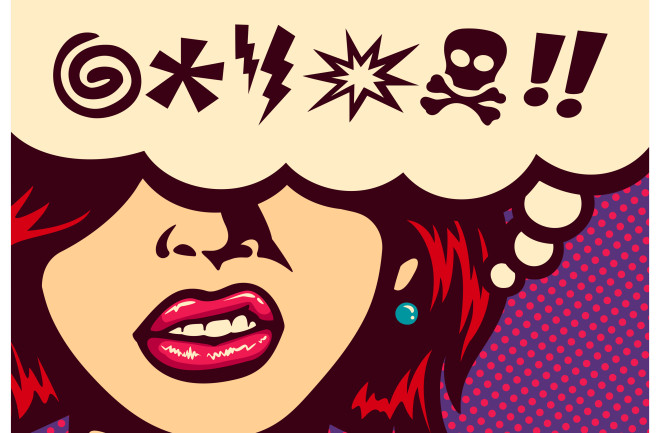What makes a swear word? Why are some words more profane than others?
Temple University researcher Jamie Reilly et al. examine this question in a new paper called "Building the perfect curse word: A psycholinguistic investigation of the form and meaning of taboo words."
Reilly et al. started out by getting MTurk participants to rate the tabooness of a set of 1,194 English words. Each word was given a score from 1 (least taboo) to 9 (most taboo). The authors then tried to predict the tabooness of each word based on 23 variables, which included both semantics (meaning) and phonology (word length and sound).
It turned out that semantics were the most important predictor of obscenity:
Taboo words are slightly more abstract than concrete and more often connote body parts, bodily acts, gender, and/or disease.
The phonology of words wasn't strongly related to their tabooness, and neither was word length — meaning that "four-letter words" are not, in fact, more likely to be rude ones.
But Reilly et al. didn't stop with single words. Noting that word combinations (compounds) can produce an almost infinite variety of novel terms, the authors went on to consider taboo compounds.
This led them to write one of the more colorful phrases in any methods section I've read:
We examined a potential source of emergent tabooness when combining extant taboo words (e.g., shit) with common nouns (e.g., gibbon) to form novel compounds (e.g., shitgibbon).
Reilly et al. took 487 common, innocuous English words and asked participants to consider how well they would lend themselves to being combined with a profanity (they give the example "assdoor").
The volunteers rated each word for its "compoundability," and they could choose whichever taboo word they thought would best match with each normal word.
It turned out that phonology mattered in this case: shorter words with more stop consonants were seen as better taboo compound candidates.
In terms of semantics, "body part," "receptacle" and "animacy" were the features that best predicted a word that could be fruitfully compounded with a taboo.
The five strongest candidates for taboo compounding included sack, trash, pig, rod, and mouth ... the five least acceptable candidates were fireplace, restaurant, tennis, newspaper, and physician.
In other words, calling someone an assmouth is likely to be a more effective insult than calling them an assrestaurant. (I'm not sure I agree with that.)
To me, the most interesting result here is that taboo words don't have a characteristic phonology, but phonology does determine how easily a word can be paired with a taboo term. I wonder if this is related to how certain words just sound funnier than others.


